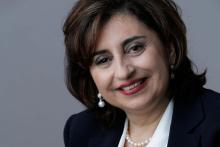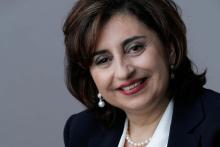Speech: Let’s put an end to ‘Where are the women’?
Climate change is further increasing inequalities and fueling tensions. Drought, and desertification are, as with all crises and conflict, directly increasing gender-based violence. These inter-related facts hold us all back from achieving our aspirations. And women and girls are bearing the brunt of descents into conflict or coups.
This cannot continue. It is contrary to everything that has been committed to in these very chambers, starting with Resolution 1325. It is contrary to our collective promise of Agenda 2030 and a more sustainable and peaceful future.
It was also committed to in March this year, at the 66th session of the Commission on the Status of Women (CSW). The Commission resulted in the first ever Agreed Conclusions focusing on gender equality and the empowerment of women and girls in the context of climate, environment, and disaster risk reduction. We must all work together to take the promises made at the CSW forward.
Any war or conflict impacts the entire life cycle of women and girls. From disrupting education to early forced marriage, sexual and gender-based violence, lack of livelihoods, food insecurity, lack of access to shelter, sanitation, and dignity. It sets us back decades.
Look to Ukraine, where the war has now surpassed 100 painful days. Reports of sexual violence are increasing. Human trafficking is increasing. And millions of mostly women, children and older persons have fled their homes. Look to Syria where eleven years of conflict has increased early forced marriage, gender-based violence and mass displacement. Look to the Sahel, where increased violent extremism is driving inequalities, food insecurity and violence.
In all these conflicts, women face additional threats to their bodies, their livelihoods, and their safety. Yet – also in all these conflicts, women are risking their lives as leaders in their communities, as the head of the household, as peacebuilders and mediators.
In the year 2000, through UN Security Council Resolution 1325, we agreed to protect women and girls in situations of conflict and to ensure that women are front-and-centre in finding peace. We have further sharpened these commitments through nine other resolutions which followed.
Many of you in this room have made national commitments as well, notably through National Action Plans on Security Council Resolution 1325. In total, we now have 100 National Action Plans globally. I applaud this historic figure. Even during the trials of the past years, Member States managed to continue this work. The UAE, Malawi and Morocco are among countries that have announced their first national action plans on Resolution 1325 in the past year.
Most Regional Organizations have also committed to this path. Twelve Regional Organizations have adopted action plans on women, peace and security, up from five when we celebrated the 15th anniversary of Resolution 1325 in 2015. We applaud Regional Organizations for these efforts.
What we have seen is that when Member States get together and make commitments in the halls of Regional Organizations, national actions often follow. For example, once the Economic Community of West African States committed to this goal, 12 out of the 15 countries in that region followed suit. The African Union committed to ensuring half of its members would adopt plans by 2020 and has surpassed this target.
Regional organizations have also played a key role in the development of networks of women mediators. Nearly every region and sub-region now has at least one such network.
The Association of Southeast Asian Nations has had a registry of women experts in peace and mediation since 2018. The African Women Leaders Network (AWLN) has 29 national chapters now, and FemWise regularly deploys its members to peace processes and national dialogues led by the African Union.
More recently, networks were launched which cover the Southern Cone in the Americas and the Arab States region. The Arab women mediator’s network is the first of its kind, bringing together Arabic-speaking women leaders to be deployed to local and regional mediation processes. I encourage all member states to utilize these networks.
Yet, with all this institutional progress, almost every time there are political negotiations, peace talks – we still have to ask, ‘where are the women?’
The reason is simply that we have not fully honoured our commitments.
Take the Sahel, where we have the G-5 Sahel Women’s Platform, the Network on Peace and Security for Women in the ECOWAS Space, the West African Network of Young Female Leaders, and others. Many of you in the Security Council are members of the Group of Friends of Women in the Sahel, co-chaired by the African Union and the European Union.
Yet, we often see that the analysis and inputs from the platform are not adequately reflected in political updates.
In the Great Lakes Region, there is significant investment in mobilizing women, peace and security actors. The Ministers of the Member States of the International Conference on the Great Lakes Region have just adopted a new plan, and we have the Regional Women’s Forum and the Advisory Board for Women, Peace and Security.
But these activities seem separate from the political talks to bring about a solution to the rising violence in eastern DRC, where an increase in attacks by the M23 and the ADF and the growing influence of ISIS has led to the killing, rape, abduction and displacement of so many Congolese women, once again.
We must ensure that women’s networks and women’s tracks are part and parcel of the political tracks. That women are equally included, and their voices and solutions are heard and included.
I ask that the multilateral system, all of us, defend our values with the same determination as the women’s movement does. I ask that we all be undeterred by the current challenges and negative developments.
To do this, we must honour our commitments. Ensure that all response efforts fully include the voices of women leaders. We must ensure that women are part and parcel of finding peaceful solutions, of recovery and of prevention mechanisms.
As regional organizations, when you convene negotiations, ensure that you do not have to ask yourselves, where are the women? Make sure that women are there. In their own right. With their own lived experiences. Their own knowledge, and with their vision for their future.
As was confirmed in the recent evacuation of human rights defenders and others from Afghanistan, we must all do a better job to provide support, protection and in many cases asylum, temporary relocation, or protected status to people in harm’s way facing gender-based persecution.
Regional organizations can spur these reforms in both legislation and administrative procedures among their membership. Less than a month ago, the Council of Europe adopted a new recommendation to protect the rights of migrant, asylum-seeking, or refugee women and girls, in the wake of the displacement of millions of Ukrainians.
Let us also recall that civil society are our vital partners in these situations, yet they often pay a heavy price when conflicts begin, and their funding becomes jeopardized.
Last year, the Women’s Peace and Humanitarian Fund supported 215 civil society organizations, reaching 10.6 million people directly and indirectly, including forcibly displaced women, women and girls with disabilities and survivors of sexual and gender-based violence.
The Fund also facilitated the evacuation of several Afghan women and dependents after the Taliban takeover, providing vital one-off emergency funds. The Fund is also providing life-saving support to women’s organizations in Ukraine, who stay and continue to deliver services. In Mali the Fund directly supported young women with diversification of income, entrepreneur, and business opportunities.
By investing in livelihoods, we invest in the future, and we invest in an inclusive and sustainable recovery.
To conclude, I hope these examples inspire you. For our part as UN Women and partners, we plan to do much more. But we need the international community, including all regional organizations, to stand in solidarity with us, and fully honour the commitments we have made to and with women and girls in conflict situations.
This is how we restore the balance, gain a chance of peace, and stand up, together, for our shared values. The peace and security to which we aspire, will only be possible when women play a central role.
I thank you.

